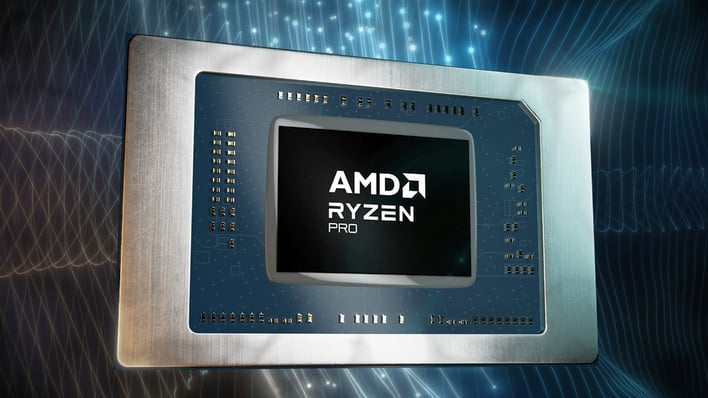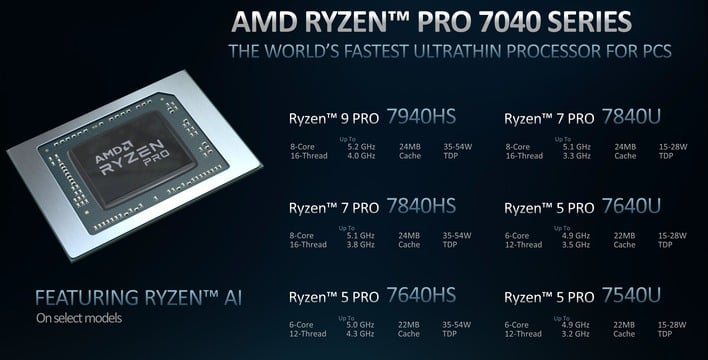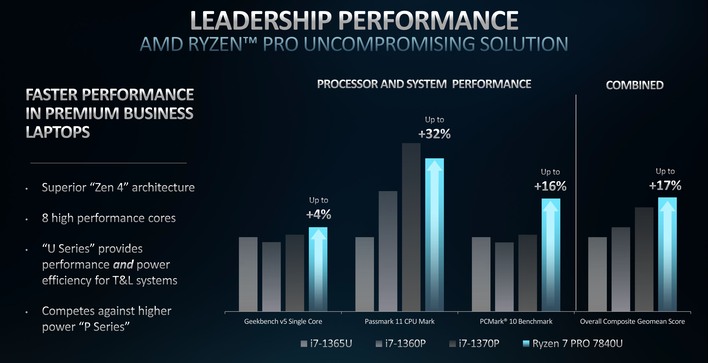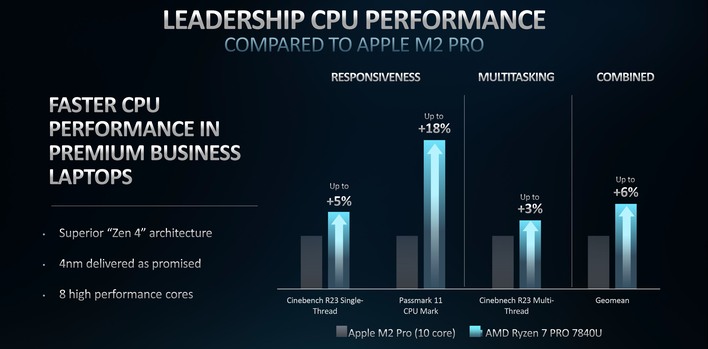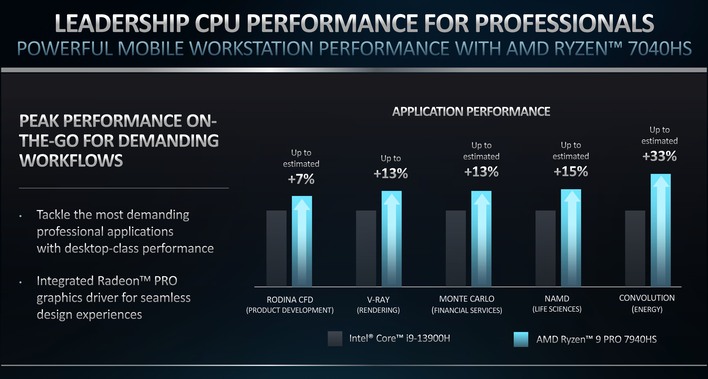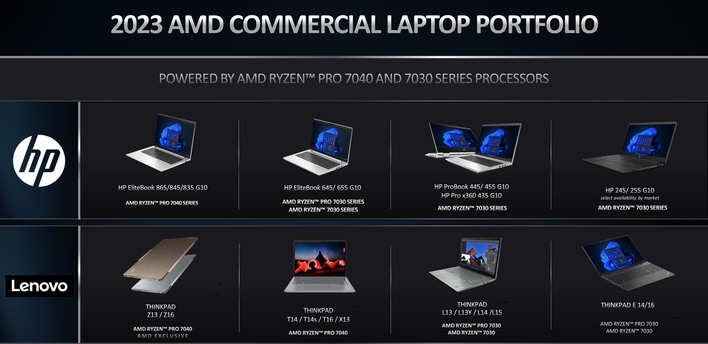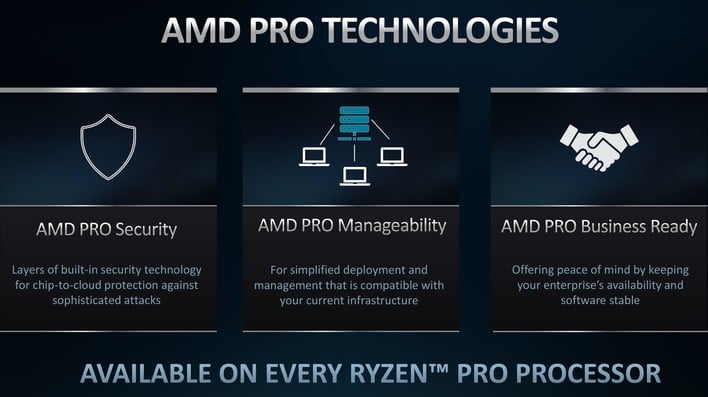AMD Introduces Ryzen 7000 PRO Family Of Zen 4 CPUs For Enterprise Laptops And Desktops
Truth be told, most business users could get by just fine on a regular old Ryzen processor. It really is true that typical consumers and gamers have different expectations of their hardware than your usual business user, though. Instead of bleeding-edge performance and the latest features, business customers are more concerned with getting rock-solid stability, remote management features, and high efficiency.
Well, what if you could have your cake and eat it, too? That's what AMD is promising with its latest crop of "PRO" series CPUs, known simply as the Ryzen PRO 7000 Series processors. The new lineup includes both laptop and desktop CPUs, and while the latter are based on familiar Raphael silicon, the former are based on new and exciting Phoenix silicon.
Not that Phoenix is really all that new; AMD announced chips based on this silicon back at CES of this year, some six months ago. In that time the consumer parts have slowly crept onto the market while AMD has worked to refine their platform to make it suitable for PRO users.
There are six Ryzen 7000 PRO processors on the way for laptops, three of which are "HS" models with TDPs ranging from 35 to 54W (depending on the OEM's configuration), and three of which are "U" models with lower 15-28W TDPs. Two of the "HS" chips keep the full allotment of eight SMT-capable Zen 4 CPU cores and clock as high as 5.2 GHz, while only the Ryzen 7 PRO 7840U keeps that configuration.
Meanwhile, the other three processors drop two cores and some clock rate to suit their positioning in the product stack. It's also likely that some of these processors miss out on the Ryzen AI accelerator included on the Phoenix die, but AMD doesn't elaborate on which chips get it and which ones don't. The company simply claims that the "Ryzen AI" accelerator is available on "select models." Hmm.
AMD doesn't shy away from comparisons with the competition, either. The slide above compares the Ryzen 7 PRO 7840U against three 28W Intel processor and shows AMD's CPU generally—but not exclusively—coming out ahead. AMD claims its chip is 17% faster on average across general processor and system performance benchmarks.
AMD also compares one of its new parts against Apple's M2 Pro SoC. The comparison isn't as favorable as it is against Intel's parts, but AMD's own numbers have it coming away with a win, unsurprisingly. This is a different set of benchmarks and includes Cinebench rather than Geekbench, which is a curious change considering the competition.
Of course, a PRO CPU is going to be used for professional computing, so AMD ran a bunch of productivity benchmarks on a Ryzen 9 PRO 7940HS and compared them directly against a Core i9-13900H. Once again, in AMD's own benchmarks, it comes out ahead. It's notable that some of these tasks are very scalable across multiple cores, like NAMD, and the Core i9-13900H has fully six more CPU cores than AMD's part. Of course, eight of those are puny E-cores that probably aren't helping much in a task like NAMD.
AMD points out that HP and Lenovo have a fairly broad array of Ryzen PRO laptops on the way, although some of the models in this list are using Ryzen 7030 processors that are essentially reheated Rembrandt silicon—that is, Ryzen 6000 mobile processors. Not that there's anything wrong with that; those chips are great (particularly in terms of power efficiency), but they're not nearly as interesting as the new parts.

As we mentioned, there are also some desktop Ryzen PRO CPUs launching today. To be specific, there are three chips, comprising one each from Ryzen 5, Ryzen 7, and Ryzen 9 families. The perceptive may note the similarity of these three chips to the 65W "non-X" Ryzen 7000 processors that launched back in January. Indeed, they are fundamentally identical aside from the fact that these are PRO processors and thus support the suite of AMD PRO technologies.
Oddly, with this launch, AMD is going extremely light on the details of exactly what constitutes its "PRO technologies" beyond the slide above. We can assume that, like previous AMD PRO processors, the CPUs will have multi-layered security technology including the Pluton security processor, an integrated management engine for remote configuration and easy deployment, and the usual suite of "business ready" features: 18 months of stable software, 24 months of planned availability, and an improved validation process.
Despite these being new products, there's no pricing to discuss. That's because it's not really up to AMD what the customer pays for these parts. The PRO series of processors are typically only available through OEMs, although you'll doubtless see folks reselling them on eBay and AliExpress. Systems with the Ryzen PRO 7000 processors should become available any day now.
Well, what if you could have your cake and eat it, too? That's what AMD is promising with its latest crop of "PRO" series CPUs, known simply as the Ryzen PRO 7000 Series processors. The new lineup includes both laptop and desktop CPUs, and while the latter are based on familiar Raphael silicon, the former are based on new and exciting Phoenix silicon.
Not that Phoenix is really all that new; AMD announced chips based on this silicon back at CES of this year, some six months ago. In that time the consumer parts have slowly crept onto the market while AMD has worked to refine their platform to make it suitable for PRO users.
There are six Ryzen 7000 PRO processors on the way for laptops, three of which are "HS" models with TDPs ranging from 35 to 54W (depending on the OEM's configuration), and three of which are "U" models with lower 15-28W TDPs. Two of the "HS" chips keep the full allotment of eight SMT-capable Zen 4 CPU cores and clock as high as 5.2 GHz, while only the Ryzen 7 PRO 7840U keeps that configuration.
Meanwhile, the other three processors drop two cores and some clock rate to suit their positioning in the product stack. It's also likely that some of these processors miss out on the Ryzen AI accelerator included on the Phoenix die, but AMD doesn't elaborate on which chips get it and which ones don't. The company simply claims that the "Ryzen AI" accelerator is available on "select models." Hmm.
AMD doesn't shy away from comparisons with the competition, either. The slide above compares the Ryzen 7 PRO 7840U against three 28W Intel processor and shows AMD's CPU generally—but not exclusively—coming out ahead. AMD claims its chip is 17% faster on average across general processor and system performance benchmarks.
AMD also compares one of its new parts against Apple's M2 Pro SoC. The comparison isn't as favorable as it is against Intel's parts, but AMD's own numbers have it coming away with a win, unsurprisingly. This is a different set of benchmarks and includes Cinebench rather than Geekbench, which is a curious change considering the competition.
Of course, a PRO CPU is going to be used for professional computing, so AMD ran a bunch of productivity benchmarks on a Ryzen 9 PRO 7940HS and compared them directly against a Core i9-13900H. Once again, in AMD's own benchmarks, it comes out ahead. It's notable that some of these tasks are very scalable across multiple cores, like NAMD, and the Core i9-13900H has fully six more CPU cores than AMD's part. Of course, eight of those are puny E-cores that probably aren't helping much in a task like NAMD.
AMD points out that HP and Lenovo have a fairly broad array of Ryzen PRO laptops on the way, although some of the models in this list are using Ryzen 7030 processors that are essentially reheated Rembrandt silicon—that is, Ryzen 6000 mobile processors. Not that there's anything wrong with that; those chips are great (particularly in terms of power efficiency), but they're not nearly as interesting as the new parts.

As we mentioned, there are also some desktop Ryzen PRO CPUs launching today. To be specific, there are three chips, comprising one each from Ryzen 5, Ryzen 7, and Ryzen 9 families. The perceptive may note the similarity of these three chips to the 65W "non-X" Ryzen 7000 processors that launched back in January. Indeed, they are fundamentally identical aside from the fact that these are PRO processors and thus support the suite of AMD PRO technologies.
Oddly, with this launch, AMD is going extremely light on the details of exactly what constitutes its "PRO technologies" beyond the slide above. We can assume that, like previous AMD PRO processors, the CPUs will have multi-layered security technology including the Pluton security processor, an integrated management engine for remote configuration and easy deployment, and the usual suite of "business ready" features: 18 months of stable software, 24 months of planned availability, and an improved validation process.
Despite these being new products, there's no pricing to discuss. That's because it's not really up to AMD what the customer pays for these parts. The PRO series of processors are typically only available through OEMs, although you'll doubtless see folks reselling them on eBay and AliExpress. Systems with the Ryzen PRO 7000 processors should become available any day now.

